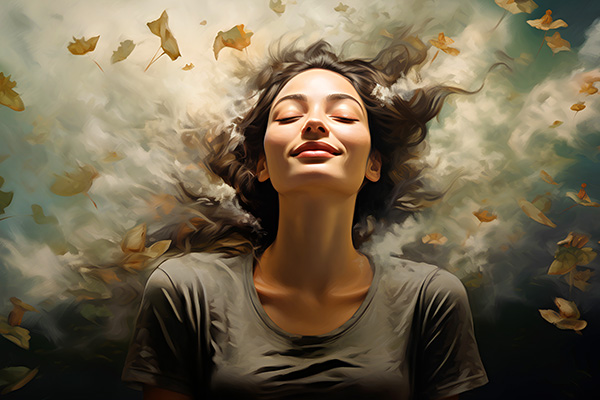spiritual self-care
The Ripple Effect Of Radiating Good Vibes!
 There have been times when leaving home on a miserable day has felt like a major challenge for me as an empath. However, after completing my errands, I often find myself unexpectedly uplifted, simply by the energy of the people and places I encounter.
There have been times when leaving home on a miserable day has felt like a major challenge for me as an empath. However, after completing my errands, I often find myself unexpectedly uplifted, simply by the energy of the people and places I encounter.
Recently, while shopping for a new journal, one particular notebook caught my eye because of the title printed on the cover: Good Vibes. I ended up going back to add it to my cart because those two simple words stuck with me. Some good vibrations are certainly always welcome in today’s chaotic world!
In this particular store, the staff is incredibly friendly, always ready with a smile and a warm greeting. Even the people stocking the shelves take a moment to acknowledge customers, creating a welcoming atmosphere. These small, everyday interactions are still commonplace in the small town where I live in Spain, and long may they continue!
The little notebook and this friendly exchange reminded me that “good vibes” is not just a phrase on a cover, but a very real force that shapes our daily experiences.
As I was driving home thinking about this, I noticed a gentleman who was busy smoothing out some gravel on the country road. He had stopped to have a conversation with the person in the car in front of me.
As I was about to go around them, he said goodbye to the person he was talking to and approached me. My first thought was that he was trying to warn me of a problem on the road ahead or maybe point out a problem with my car. It was drizzling and damp and he was soaked, but when I rolled down my window he just smiled and asked how I was doing.
Practical Techniques For Psychic Protection
 Psychic protection, also known as spiritual or energetic protection, is a practice I hold dear because it helps shield me from negative energies, psychic attacks, and unwanted influences.
Psychic protection, also known as spiritual or energetic protection, is a practice I hold dear because it helps shield me from negative energies, psychic attacks, and unwanted influences.
The concept is not new. Mystical protection practices can be traced back to various ancient civilizations, indigenous traditions, Eastern philosophies, and Western esoteric practices.
In ancient Egypt, Greece, and Rome, amulets and talismans were worn and protective deities invoked to ward off negative energies and evil spirits. Indigenous cultures in the Americas and Africa used smudging and rituals to summon ancestral spirits for protection.
Eastern religious traditions such as Hinduism and Buddhism use mantras, yantras, and meditation for spiritual protection. Kabbalistic traditions emphasize the use of specific prayers and rituals to create spiritual shields. These practices reflect a deep-rooted belief in the power of divine intervention and sacred symbols to provide protection.
In Catholicism, believers recite prayers such as the Lord’s Prayer or the prayer to St. Michael for protection from evil. They may also use holy water, crucifixes, or medals of saints as protective symbols. In Judaism, the recitation of Psalms and the use of amulets inscribed with Hebrew verses are common practices for protection against negative influences.
Contemporary spiritual communities have adapted these ancient practices to include the use of crystals, energy healing, and visualization techniques. Workshops, books, and teachings offer a wealth of methods for psychic protection, all aimed at maintaining a balanced, protected, and positive state of being. These diverse traditions and modern adaptations underscore the universal spiritual need to protect ourselves from unseen negative energies and dark influences.
Coping With The Loss Of A Loved One
 The loss of a loved one is one of the most profound and challenging experiences we can have. Even if we have a deep spiritual belief that our loved one has crossed over into the spirit realm free of pain and suffering, the grief of their physical absence remains.
The loss of a loved one is one of the most profound and challenging experiences we can have. Even if we have a deep spiritual belief that our loved one has crossed over into the spirit realm free of pain and suffering, the grief of their physical absence remains.
It is natural to mourn their departure, to feel the sting of their absence in our daily lives, and to struggle with the reality of a world that feels less complete without them.
For those who have lost a parent, this grief can bring an added layer of vulnerability. Regardless of our age, the loss of a mother or father can leave us feeling untethered, with a foundation in life that once provided security and guidance now shaken. Even if we have spent years caring for them through illness or decline, their passing can still leave us feeling profoundly alone.
This transition marks a significant shift, not only in our outer reality, but also in our inner identity. And yet, in the depths of grief, there is an opportunity for deep reflection, gratitude, and connection.
One of the most powerful ways to navigate grief is to focus on gratitude for the connection you shared with your loved one. Their love, wisdom, and presence shaped you in countless ways, and that influence does not disappear with their passing. Celebrate their life with vigor. Share their stories, embrace cherished memories, and allow their laughter to echo through your heart.
Living In A State Of Transcendence
 Many people may claim to live in a state of spiritual enlightenment, to be fully aware and to have a deep connection with the divine. However, what many believe to be enlightenment is often far from the truth.
Many people may claim to live in a state of spiritual enlightenment, to be fully aware and to have a deep connection with the divine. However, what many believe to be enlightenment is often far from the truth.
There is a veil — a mental barrier — before most people that prevents them from seeing the greater spiritual truths that lie beyond the ordinary world. Although many people long to lift this veil, to look beyond the surface and access a more expansive reality, it can be incredibly difficult to reach this state of bliss.
However, once you do break through, the liberation and freedom you feel is incomparable. It’s a feeling that is difficult to describe with words, but it’s something that everyone is capable of experiencing.
The path to transcendence is a path of spiritual growth and soul evolution. When you reach this blissful state — when your soul has truly expanded — you move to a higher frequency, one that is different from the frequency to which most people are attuned.
For much of my life, I felt like a misfit — a person who didn’t quite fit into the mainstream world. I felt disconnected from social norms and expectations. But today, I embrace that feeling. I’ve come to realize that being an individual, separate from the chaos of the world, is one of the greatest gifts I could have. I no longer need to be part of a particular group or adhere to a particular set of societal standards. This freedom allows me to live authentically and to help others reach the same state of bliss and spiritual awareness.
A Cord Cutting Ritual To Let Go And Move On
 Heartbreak can be one of the most difficult emotional hurdles we face.
Heartbreak can be one of the most difficult emotional hurdles we face.
Whether you’re recovering from a failed romantic relationship, a friendship that has run its course, going no contact with a toxic family member, or any significant emotional connection that has ended, finding closure and healing is essential to moving forward.
Unresolved emotions and lingering energetic attachments can weigh heavily on your heart, making it difficult to embrace new opportunities and experiences.
A powerful way to release these lingering energy attachments is through a cord-cutting ritual. This practice helps cultivate self-love and emotional freedom, and opens the door to new beginnings. Unlike repressing feelings or rushing into distractions, cord cutting allows you to consciously acknowledge and release energetic attachments that no longer serve you.
Energetic cords are metaphysical connections that form between people, places, or situations. They are strengthened by intense emotions and shared experiences. While some cords nourish us with love, support, and positive energy, others can drain our vitality — especially when a relationship has ended or become unhealthy. These draining cords can lead to repetitive thoughts, emotional stagnation, or a feeling of being energetically “stuck.”
A cord cutting ritual does not erase cherished memories or sever positive emotions you may have shared with someone. Instead, it focuses on releasing unhealthy attachments that prevent emotional freedom and personal growth. By clearing these residual energies, you make room for peace, clarity, and new possibilities to flow into your life.
It’s Time To Take Better Care Of Your Self!
 Only you know when it’s time to step into your authentic self. Only you know when it’s time to break free from the constraints of a life that no longer serves you and start living the life you were meant to live.
Only you know when it’s time to step into your authentic self. Only you know when it’s time to break free from the constraints of a life that no longer serves you and start living the life you were meant to live.
If your daily routine feels like running on a hamster wheel – repetitive, exhausting and uninspiring – it is time to step off and embrace change.
Doing the same thing the same way will always produce the same results. But by making small changes, you can cultivate a life of balance, joy, and fulfillment.
We are often our own worst critics. That little voice in your head may be whispering, “I can’t do this. I’m not good enough. I don’t deserve happiness.” These negative thoughts act as invisible barriers holding you back from personal growth.
It’s time to clear the mental clutter and make room for self-love and self-confidence. Replacing negative self-talk with empowering affirmations will shift your perspective and help you align with your highest potential.
Let go of the idea that we can rewrite the past. The past is past, and you have the power to create a new, fulfilling present. Living in the moment allows you to fully experience life without the weight of regret or fear of the unknown.
Your thoughts create your reality. A positive outlook attracts positive experiences, while negativity creates more negativity. The words you use-both out loud and in your mind-hold energy and influence your emotions and interactions. Even simple word choices can change the tone of a conversation and affect outcomes. By consciously choosing optimism, you can improve your relationships, well-being, and overall happiness.
Unlock The Door To Mental Freedom
 We’ve all been there — lost in thought, replaying a conversation from years ago, wishing we’d said something different, or fixating on something that hasn’t happened yet and probably never will.
We’ve all been there — lost in thought, replaying a conversation from years ago, wishing we’d said something different, or fixating on something that hasn’t happened yet and probably never will.
Our minds have a clever way of trapping us in the past, or pulling us too far into the future. In the process, we miss the beauty and joy of the present moment.
Being fully present is the key to happiness — the hidden treasure of everyday joy and fulfillment.
When we embrace the here and now, we experience true mental freedom. Instead of being burdened by past regrets or future fears, we begin to see life as it is — vibrant, alive, sometimes challenging, but always full of infinite possibilities and countless blessings waiting to be appreciated!
Think about the last time you were fully immersed in any experience. Maybe it was watching a sunset where the sky lit up with color, listening to music that made your soul soar, or laughing with a friend until your stomach hurt. In those moments, you weren’t dwelling on past mistakes or worrying about tomorrow’s to-do list — you were just there, experiencing life in real time.
Now, think about how often you are distracted by the constant pull of digital technology that keeps you from being fully present. Your phone pinging with notifications, drawing your attention away from the people and experiences around you.